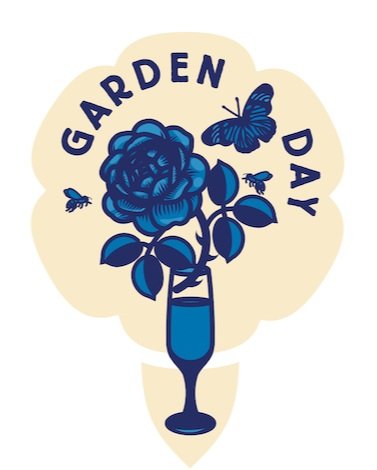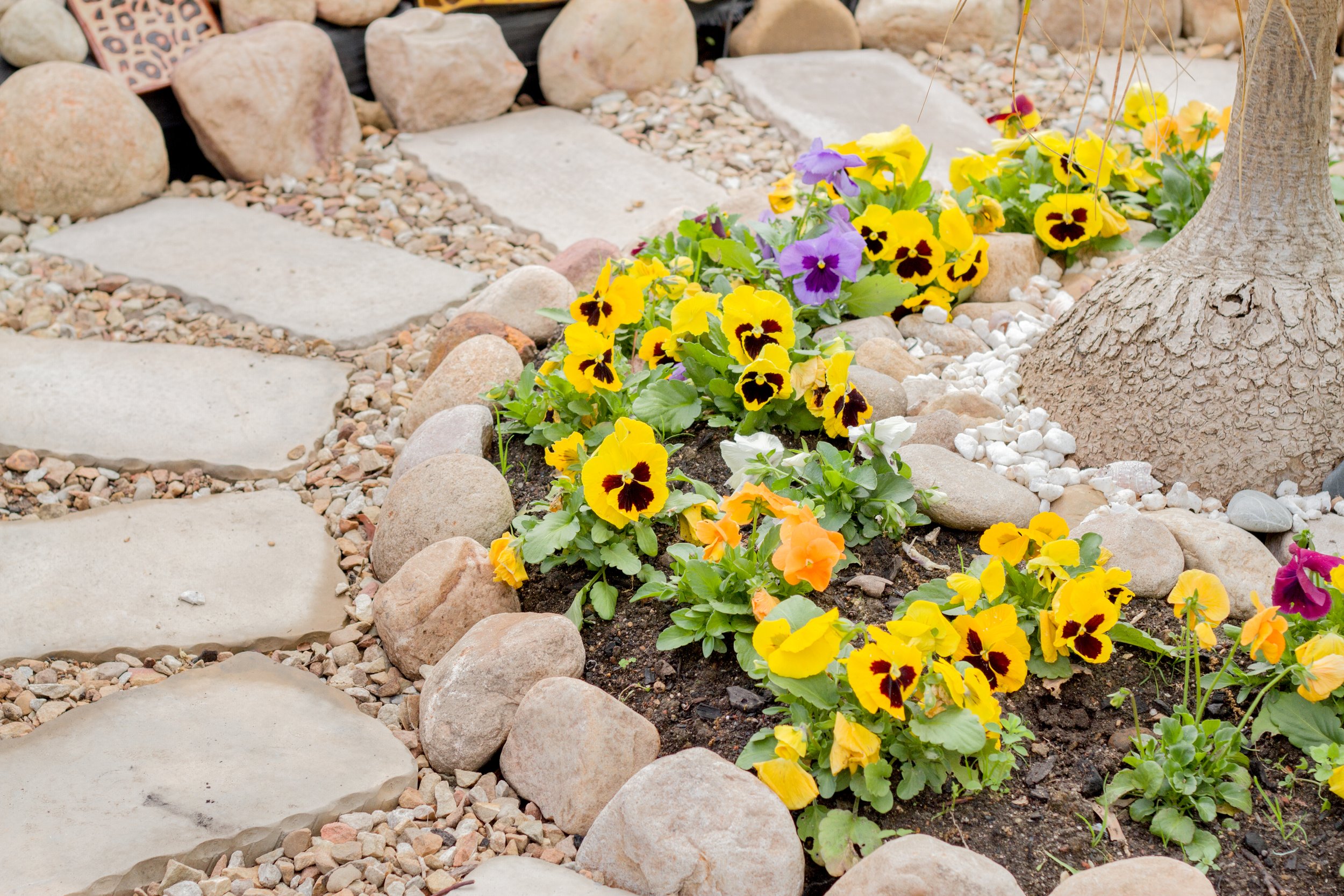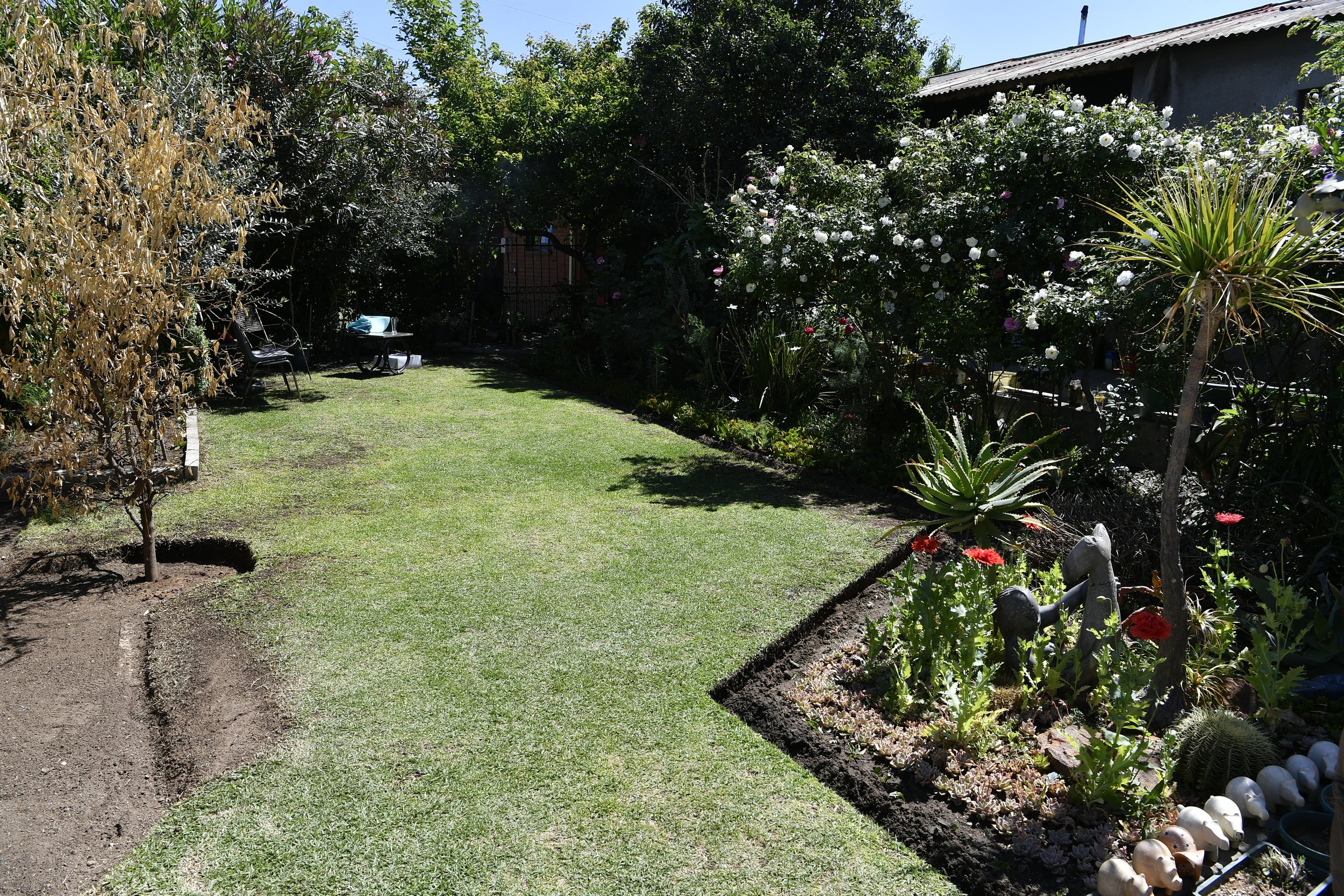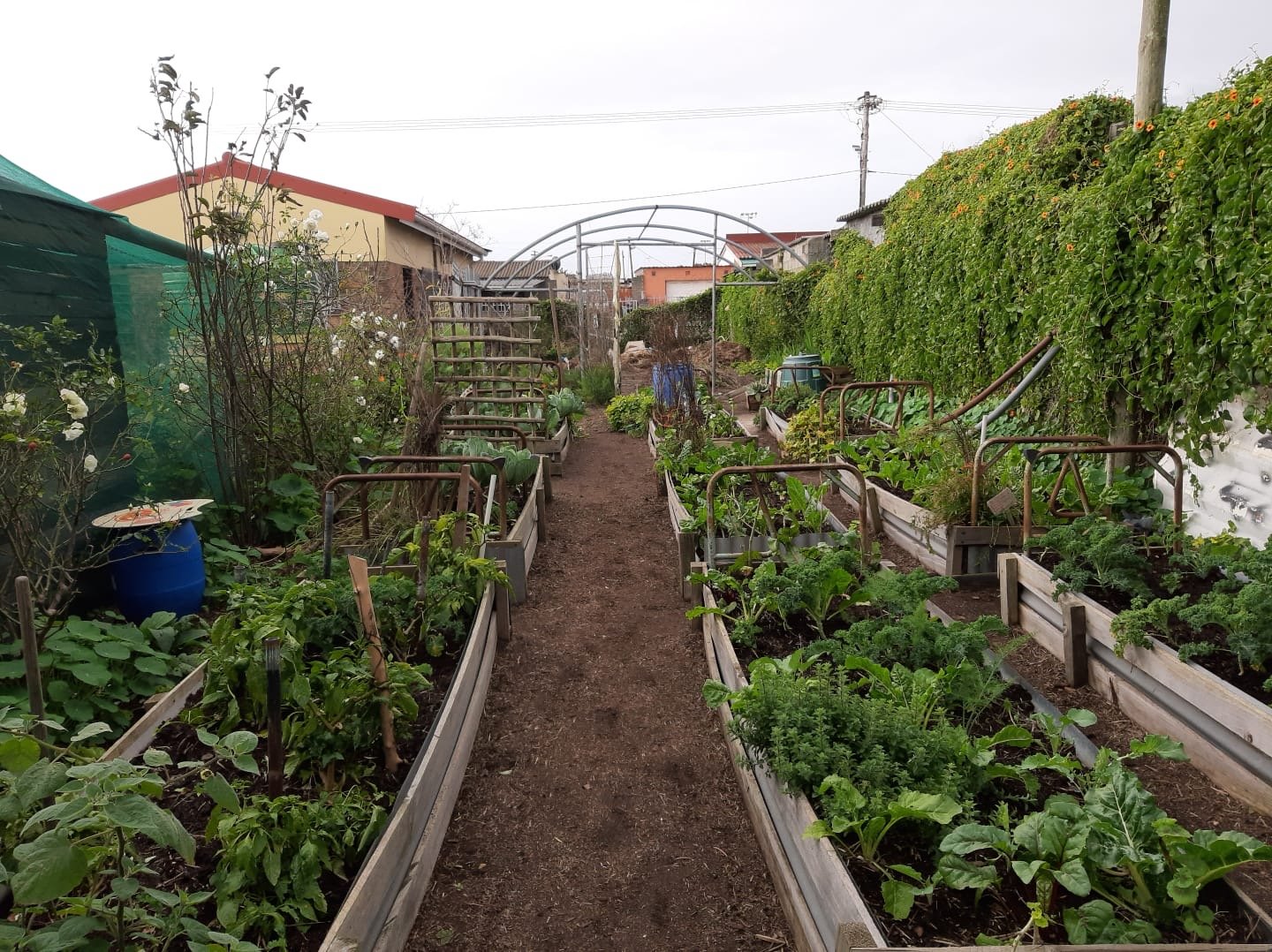
Health Benefits
According to UK economist & behavioural scientist, Professor Paul Dolan, gardeners & florists are the happiest of all professions.
GET TALKING TO YOUR PLANTS
-
Talking to your plants to improve their growth is a well-known old gardener’s tale, but believe it or not, numerous studies have indicated that playing music for plants does in fact promote faster, healthier growth.
However, it isn’t so much about the “sounds” of music, but more to do with the vibrations created by the sound waves. The vibrations produce movement in the plant cells, which ultimately stimulates the plant to produce more nutrients.
Not to mention the benefits that music has on us as humans … music provides a total brain workout. Research has shown that listening to music can reduce anxiety, blood pressure, and pain as well as improve sleep quality, mood, mental alertness, and memory.
Giving us two good reasons to pump the volume this Garden Day.
GARDENING AND MEMORY
-
Research shows that daily gardening may lower the risk of dementia by 36%. According to a Swedish study, engaging brain-stimulating activities reduces the risk of Alzheimer’s disease as much as physical activity would.
For those suffering from dementia or other memory loss conditions, gardening may be the answer. Taking part in gardening activities has the power to help regain gradual memory loss. The reason for this being, the amygdala, which is the centre of the brain, allows us to recall memories that appeal to our emotions. Gardening can be used as a form of rehabilitation in improving brain activity – helping individuals revisit those long-term memories.
Who knew remembering where you put your garden fork would promote brain health?
KEEPING FIT IN THE GARDEN
-
The fact of the matter is, we are all ageing, that is inevitable! We can no longer perform things with such vigour the way we used to. As we become older, we begin to do things a little slower, and with slightly more difficulty. And there is no shame in that! This is because our motor skills eventually begin to decline. Motor skills refer to the way in which our muscles coordinate (in order) to do different things. In simple terms, it is how we move. And it is entirely common to lose strength and dexterity in our hands as the days pass – limiting the daily activities we can perform.
On a positive note, do you know what keeps your hands strong and nimble? You guessed it…Gardening! Active gardening can play a big role in enhancing your motor skills. No matter what age you are, gardening is a guaranteed healthy addition to your lifestyle – so roll up your sleeves and dig in!
GARDENING AND COSMETICS
-
Some of the best and most healthy solutions to hair loss can be found in … your garden! For years, plants and herbs have been used to facilitate hair growth.
Rosemary, chia seeds, green tea, avocado, kale, basil, beets, and microgreens are all said to do wonders in terms of boosting hair growth and ensuring a smooth, silky texture. Many of which can be easily and inexpensively grown in your own garden. So as your backyard comes to life, so will your hair!
But this is not where the nourishing benefits of gardening come to an end… Did you know that gardens can also contribute to better-looking skin? This is due to a variety of factors:
Enhanced nutrition – If you’re manning a garden, it is likely that you’re consuming the wonderful fresh produce (we hope). A diet rich in B-carotene and lycopene (found in fruits and vegetables such as tomatoes, carrots, broccoli, and pumpkin) increases the skin’s defence against UV radiation, contributing to the skin’s overall appearance and health.
There are also a bunch of other skin saviours (which can help balance and nourish your skin) that may be growing in your garden.
Physical activity – Exercise increases blood flow throughout the body, including to the body’s largest organ, the skin. A study conducted by scientists at Harvard Medical School and Brigham and Women’s Hospital, found that exercise in fact reduces the risk of psoriasis in women.
Breaking a sweat in the garden is healthy! With the act of gardening being quite labour-intensive, it is sure to get the heart pumping, giving your skin a natural glow.
Reduced stress – Simple exposure to green spaces has been proven to help reduce stress and increase one’s sense of wellness and belonging. In turn, this results in clearer skin. Science aside, less stress also means fewer worry/frown lines.
However, when pottering around in the garden, don’t forget to slather on some sunscreen or wear a hat to further protect your precious skin.
GARDENING AND SOCIAL WELL-BEING
-
Being responsible (for anything) pays big dividends in our lives. If we take care of our commitments, even if it is something we may like to ignore, we are bound to feel better about ourselves. Every step we take towards responsibility helps in raising our self-esteem and improving our relationships with others.
It has been proven that having a sense of responsibility for something in fact makes us more invested. And gardening is the perfect example of this, enforcing a sense of purpose and responsibility into our lives whilst teaching us to have respect for things other than ourselves.
Taking time out of your day to do the small things like nourish and water plants – whether it’s the little cacti on your windowsill or the family of peppers growing in your back garden, these acts will provide you with a sense of purpose and worth. Talk about a rewarding experience!
BRIGHTEN UP YOUR ENVIRONMENT
-
Plant A Palette
Gardens are anything but grey. So use colour to set the mood. Go with whites and blues to create a calming area, or get all vibrant and creative with bold reds and oranges. A vast palette is at your fingertips… you’re only limited by your imagination.
Group Your Greenery
A garden is no place for segregation, so why not mix yours up? Ornamentals grow happily alongside aromatics, herbs and even vegetables, meaning your green space can be both fun and functional.
A Touch Of Texture
Nothing says healthy and happy like a textured garden. Hardy woods with soft stems allow depth and delight, while flowers like roses will always play centre stage. And with a wide range of florals and grasses to choose from, you’ve got all the elements to create a unique tapestry.
More specifically, daisies and cow parsley are inexpensive and they attract insects and bees, whilst snapdragons, salvia, sage, aquilegia, foxgloves and forget-me-nots give you a bouquet of options to play with.
GARDENING AND MINDFULNESS
-
Ever wondered why your first glance at the abundance of flowers and plants blooming in spring elicits such happiness?
Gardening, in all its green glory, is a practice of mindfulness. The physical benefits of gardening are well-established. What is less known, is that gardening also offers intangible, mental benefits. The very act of connecting with flowers and other plants instils a sense of inner peace and calm within us that ultimately boosts overall happiness.
Have you ever heard the Chinese proverb that tells us “If you want to be happy for a lifetime, be a gardener”? Well, science backs that up. Research indicates that those who spend more time cultivating plants have a generally more positive outlook on life, experience less stress, and are happier both mentally and physically.
With phones being an obvious gateway drug for a lack of mindfulness, ditch the devices when spending time in the garden, engage in your thoughts, and let the garden be your mindfulness mentor.
GARDENING BENEFITS AT A CELLULAR LEVEL
-
Sue Stuart-Smith, psychiatrist, psychotherapist and author of The Well Gardened Mind, believes that we have evolved to be in nature. “When we work with nature outside us, we work with nature inside us,” she writes. “It is why people feel more fully alive and energised in the natural world, why gardeners report feeling calmed and invigorated.”
This link to nature is primal, entrenched in our DNA. We humans have spent far longer in sync with our surroundings than not. Jules Pretty, Professor of Environment and Society at the University of Essex, calculates that for 350,000 generations people lived in close proximity to nature. We’ve only been living in cities for six.
Gardening just feels right, but there’s a wealth of science to back that feeling up. Health and wellness expert Dr Esther M. Sternberg says that gardens are particularly effective at bringing the body to a relaxed physiological state, in part due to the amount of green in them. “The photoreceptor pigment gene that emerged first in evolutionary history is the one most sensitive to the spectral distribution of sunlight and to the wavelengths of light reflected from green plants,” she explains. The colour green requires no adjustment when it strikes the eye, so when surrounded by it in a garden, it produces a calming, restorative effect.
And on top of that, your body is doing all the right things. The exercise is a mood lifter, the distinctly earthy and musty smell of soil is familiar and grounding, your immune system is being boosted and, as neuroscientist Christopher Lowry discovered in 2010, Mycobacterium vaccae, a family of bacteria that live naturally in soil, enhance our serotonin levels. Serotonin is the key hormone that stabilises our mood, feelings of well-being, and happiness.
Caring for plants is an innately generous gesture. By planting a seed, you are setting wheels in motion, laying the foundation for a better future. It’s a mindful exercise, something so simple yet simultaneously profound. “The garden is a place that brings us back to the basic biological rhythms of life. The pace of life is the pace of plants,” writes Stuart-Smith. She also captures gardening’s reward perfectly: “Plants are so much less challenging and intimidating than people.”
GARDENING AND LIVING LONGER
-
Want to live to a hundred? Then try gardening. A global study of five places where residents are famed for their longevity – Okinawa in Japan, Nicoya in Costa Rica, Icaria in Greece, Loma Linda in California and Sardinia in Italy – found some interesting commonalities when it came to the centenarians who lived there. They all enjoyed social support networks, did their daily exercises and followed plant-based diets. But in addition, they all gardened, happily and healthily, well into their 80s, 90s and beyond. Talk about gardening for life.
GARDENING AND THE FUTURE
-
Ever felt a pang of eco-anxiety? You may not know it by name, but it’s a chronic fear of ecological and environmental disaster. At some point we’ve all thought about the future and gone cold. But the only way to turn this around is through action, and every time you plant a seed or allow your lawn to be a little wilder, you’re investing in the future. And that alone can fend off the fear.
THE HEAL DEAL
-
A History Of Healing
For centuries, from Egypt and Mesopotamia to Persia and Greece, gardens have been integral to the world of healing. A document, allegedly written by a monk in the early part of the ninth century, describes an ideal garden for the Benedictine Monastery of Saint Gall in Switzerland. In it he mentions many formal features found in today’s healing gardens: intersecting paths for contemplative walking, a well or fountain, a herb garden and a green “court” or lawn.
The Orto Botanico di Padova in northeast Italy, founded in 1545, was one of the first educational physic gardens associated with medicine, and remains one of the oldest existing botanical gardens. The vast knowledge collected from it, and many other gardens around the world, has contributed immensely to modern medicine.
The Chelsea Physic Garden in the United Kingdom has occupied four acres of land on the edge of the Thames since 1673. First established by the Apothecaries in order to grow medicinal plants, this extraordinary London garden has helped change the world, and contains a unique living collection of around 5,000 different edible, useful and medicinal plants.
Gardens were acknowledged for their rehabilitative powers as far back as the fifteenth century when Spanish patients were encouraged to take up gardening. Three centuries later German horticultural theorist, Christian Cay Lorenz, wrote some of the first recommendations for hospital garden designs. And the founder of modern nursing, Florence Nightingale, extolled the virtues of fresh air and natural sunlight, and strongly believed that plants and outdoor spaces should be valued for their healing qualities.
Nature’s Medicine
Therapeutic gardens are not just a trend… they’re the future. Research has shown that gardens are places of healing. Literally. The National Health Service (NHS) in the United Kingdom now offers green social prescribing for patients - an outdoor activity that helps them heal quicker and reduces the need for pain medication.
“As a writer, I find gardens essential to the creative process; as a physician, I take my patients to gardens whenever possible,” said Oliver Sacks, neurologist and author of Awakenings. “All of us have had the experience of wandering through a lush garden or a timeless desert, walking by a river or an ocean, or climbing a mountain and finding ourselves simultaneously calmed and reinvigorated, engaged in mind, refreshed in body and spirit. The importance of these physiological states on individual and community health is fundamental and wide-ranging. In forty years of medical practice, I have found only two types of non-pharmaceutical ‘therapy to be vitally important for patients with chronic neurological diseases: music and gardens.”
Hospitals have also begun incorporating gardens into their designs, and there are exciting future careers in horticultural therapy and therapeutic garden landscaping. Horatio’s Garden is a UK-based charity that creates and nurtures beautiful gardens in NHS spinal injury centres. Maggie’s is a cancer support charity whose award-winning buildings are surrounded by therapeutic gardens created by leading garden designers. And the Greenfingers Charity builds therapeutic gardens at children’s hospices, spaces that give children with life-limiting conditions a chance to relax and be inspired.
Whether you use them to grow edible or not, gardens are food for the soul. Numerous studies have found that gardening can assist your body in fighting disease.
Protect your mind and memory as you age.
Boost your mood endorphins.
Aid your recovery after hospitalisation.
Be good for your heart.
Improve your hand strength.
GARDENING AND DESIGN
-
Chris Beardshaw, the horticulturalist, landscape architect and 2020 Garden Day Ambassador, is a believer when it comes to the many proven benefits gained from plants, gardens, landscapes and nature. “There is evidence that flowers have immediate and long-term effects on emotions, mood, behaviour and memory,” he states. “Anyone who has spent even the shortest of moments in a well-designed garden would surely acknowledge the transformative effects it had on them.”
There’s no arguing with that, or the fact that gardens can reduce stress factors like blood pressure and heart rate while increasing comfort and tranquillity. A well-considered green space has the power to improve cognitive performance, enhancing perception and improving attentiveness and creativity. It also contributes majorly to your good mood, and positively impacts mental health.
And let’s be honest, they’re just downright beautiful spaces. So why wouldn’t you want to inhale, let go and spend some me-time in these exquisite, tranquil sanctuaries?
GARDENING AND MENTAL HEALTH
-
Growing our own vegetables or plants or simply enjoying the sights and smells of nature – all of the activities associated with gardening – can boost our mood. Spending time outdoors is great for our wellbeing, but gardening can give your time outside a greater sense of purpose. Even those without outdoor space can give nurturing certain fruits, vegetables, and plants a go, as they’ll grow on windowsills.
According to an article by comparethemarket.com, gardening keeps us active and boosts our self-esteem by giving us a sense of accomplishment. It’s associated with relieving stress and offers a chance to spend time together as a family in fresh air. Even just a short walk in the park or garden can make a difference.
HEALING AND EMPOWERING
-
Healing gardens are for everyone, but there are two very distinct types.
Visual restorative gardens contain all those bright and beautiful delights that you love. There are no hard and fast rules when it comes to creating one… you decide. It could be poppies, it could be petunias, it could even be a Zen garden that you enjoy strolling along. Regardless, these spaces are refuges of tranquillity, personal havens that offer peace and restoration.
Empowering gardens are much more interactive. If toiling, weeding and seeding are your idea of therapy, then these spaces are for you. As the sweat flows, you’ll engage with your surroundings, get your hands dirty and trigger your imagination. And you can do all this knowing that everything you plant contributes to a healthier future.
SPRUCE UP YOUR HOME OFFICE
-
Home isn’t what it used to be… and that’s not a bad thing. As living rooms double up as offices and dining room tables are turned into boardrooms, plants have become a welcome addition to these spaces. Ongoing research indicates that, in addition to purifying the air, indoor plants have an incredibly calming effect. So when the meetings drag on and the deadlines loom, it’s good to have pots of gracious green goodness nearby, minimising stress and maximising your mood. Also, they look fantastic in the background of your Zoom call.
Here are a few incredible indoor plants to consider:
English ivy – not only does it get rid of mould, but it’s always bright and perky, hanging down to say hello as you start your day.
Aloe vera – they’re easy to handle, purify the air and contain a gel that’s great for healing wounds or skin ailments.
Bamboo palm – a natural humidifier and pollutant flusher, these super-chilled plants add a tropical touch to any space.
Jade plant – a sumptuous succulent that can resemble a tree, this plant’s rich, green leaves can be pruned and given out to friends, spreading the love.















